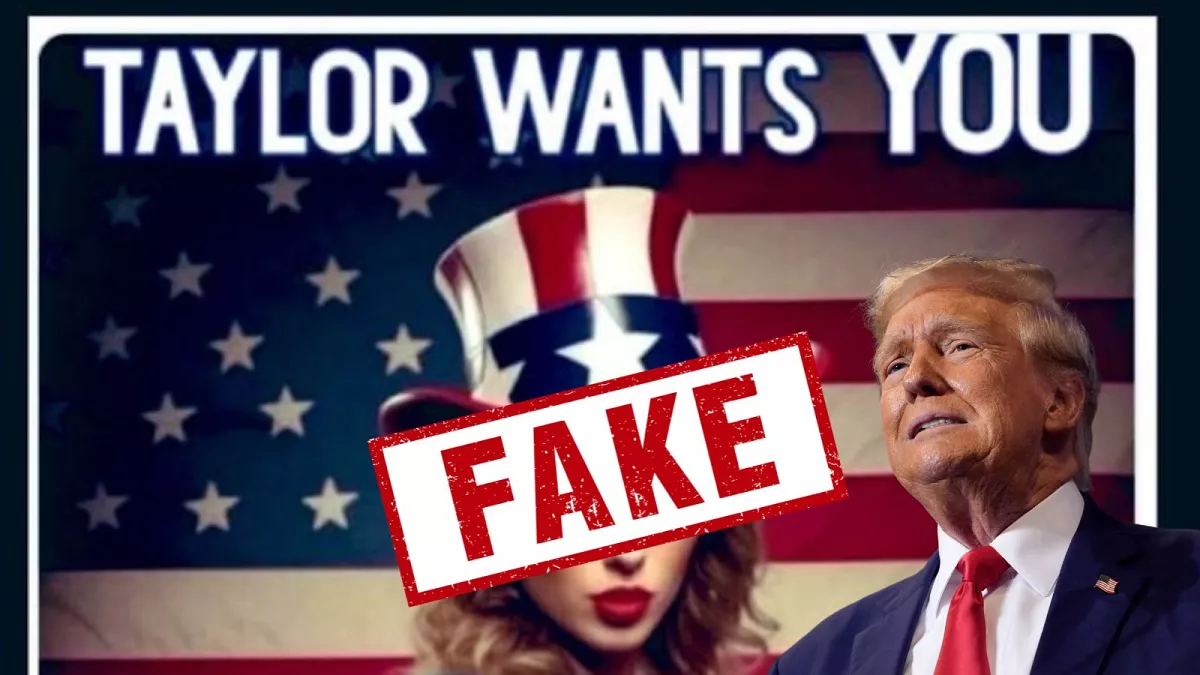
In the lead-up to major elections, misinformation often floods social media, but one of the most outrageous claims to surface is the false endorsement of Donald Trump by pop superstar Taylor Swift. This fake news story is just one among dozens of fabricated testimonies supposedly coming from actors, singers, and athletes. These bogus claims are part of a wider campaign to mislead voters and manipulate public opinion.
Taylor Swift’s Fake Endorsement Sparks Outrage
The rumor that Taylor Swift, known for her outspoken political views that lean left, was endorsing Donald Trump, quickly went viral. Fans were shocked, and social media buzzed with confusion. Swift, who has previously voiced support for progressive causes and candidates, became the target of misinformation in an apparent attempt to sway public sentiment.
This false endorsement was quickly debunked, with Swift’s representatives clarifying that the singer had not made any statements supporting Trump. Despite the clarification, the story had already spread widely, highlighting the dangerous speed at which misinformation can circulate.
A Growing Trend of Fake Celebrity Endorsements
Taylor Swift is far from the only celebrity whose name has been falsely used in political campaigns. In the past few months, several well-known actors, musicians, and athletes have been falsely attributed with political endorsements they never made. From Hollywood stars to sports icons, fake endorsements are becoming a common tactic in misinformation campaigns aimed at influencing voters.
Some fake claims have included actors endorsing candidates they’ve never publicly supported, athletes appearing in doctored videos promoting political causes, and even fake quotes from celebrities that circulate widely across social media platforms. The objective of these claims is clear: to confuse and divide the public.

How Fake Endorsements Influence Elections
The power of celebrity in shaping public opinion cannot be underestimated. Many people look up to actors, musicians, and athletes as role models, and their political views can hold significant weight with fans. This makes fake endorsements a powerful tool for spreading disinformation. By falsely linking celebrities to certain political candidates or causes, these campaigns aim to trick voters into believing that their favorite stars support a specific agenda.
What makes this tactic particularly harmful is how quickly these false claims spread. In the age of social media, it takes only minutes for a fake story to go viral, reaching millions of people before it can be fact-checked. By the time the truth comes out, the damage is often already done.
Combatting the Spread of Misinformation
In response to this growing trend of fake endorsements, fact-checkers and media outlets have ramped up efforts to combat misinformation. Platforms like Twitter, Instagram, and Facebook have introduced stricter guidelines for political content, but fake news continues to be a major issue.
Fans and followers of celebrities are encouraged to verify any political endorsements they come across and not to believe everything they read online. Many celebrities have also started taking a proactive approach, using their platforms to directly address fake claims and set the record straight with their followers.
The Impact of Celebrity Misinformation
The widespread nature of fake celebrity endorsements raises serious concerns about the integrity of information in the digital age. As more and more people turn to social media for news, it becomes increasingly difficult to separate fact from fiction. This makes it more important than ever for voters to remain informed and cautious.
While Taylor Swift’s fake endorsement of Donald Trump has been debunked, it’s a reminder of the larger problem of misinformation that plagues elections. As long as false claims continue to spread unchecked, the risk of misleading voters remains a real threat.
Leave a Reply